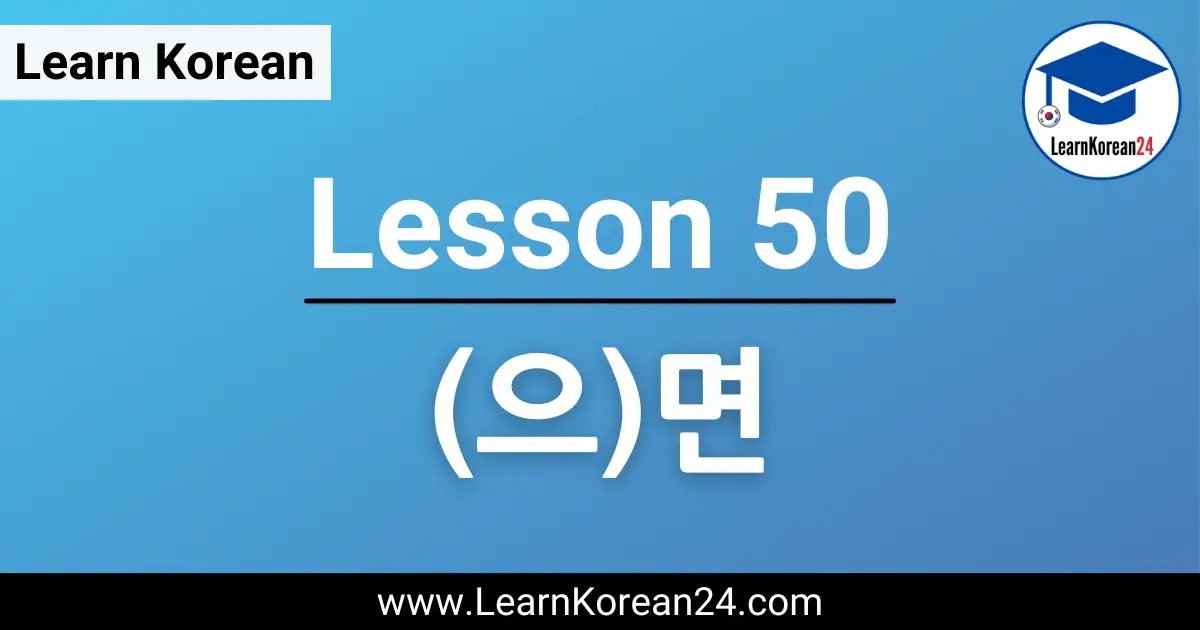Lesson 50: (으)면
In this lesson, you will learn how to say ‘if’ or ‘when’ using (으)면. By the end of this lesson, you’ll be able to say things like, “If the weather is good, I go hiking.“, “When I feel good, I dance.“, etc.
Lesson 50: (으)면
The ending (으)면 is similar to ‘if’ in English and expresses a condition or supposition. To make the sentence clearer or to emphasize the condition, you can add 만약 or 만일 before the verb / at the beginning of the conditional clause. 만약 and 만일 mean ‘in case’, and they are normally dropped in daily conversations. Let’s look at some examples.
공부하다 = to study
열심히 공부하면 시험을 잘 볼 거예요. = If you study hard, you will do good on your test.
많다 = to be much / to have a lot of
만약 돈이 많으면 뭐 하고 싶어요? = If you have a lot of money, what would you like to do?
In sentences in which the condition is a time/circumstance in which some repetitive action takes place, (으)면 is more like ‘when‘ in English. For example,
일어나다 = to get up
아침에 일어나면 항상 커피를 마셔요. = When I get up in the morning, I always drink coffee.
좋다 = to be good
기분이 좋으면 춤을 춰요. = When I feel good, I dance.
Conjugation Rules
(으)면 is attached to verbs or adjectives. When attaching (으)면 to verbs or adjectives, you must choose either 으면 or 면. The one you use depends on whether the verb ends in a consonant or a vowel. See the table below.
| Conjugation Rule | Examples |
|---|---|
| Verb Stem Ends In Consonant + 으면 | 먹다 (to eat) → 먹으면 좋다 (to be good) → 좋으면 |
| Verb Stem Ends In Vowel or The Consonant ㄹ + 면 | 가다 (to buy) → 살게요 나쁘다(to be bad) → 나쁘면 살다(to live) → 살면 |
| <Irregular Conjugations> | 듣다 (to listen) → 들으면 춥다 (to be cold) → 추우면 짓다 (to build) → 지으면 이렇다 (to be like this) → 이러면 |
(으)면 VS (으)ㄹ 때
In Lesson 47, you learned that (으)ㄹ 때 is similar to ‘when‘ in English. So, what’s the difference between (으)면 and (으)ㄹ 때?
When the condition in the sentence is some repetitive action (e.g., “When I wake up…/”, “When I feel good…“, etc.) (으)면 and (으)ㄹ 때 can be used interchangeably.
기분이 좋으면 춤을 춰요. (O) = When I feel good, I dance.
기분이 좋을 때 춤을 춰요. (O) = When I feel good, I dance.
However, to talk about something that happened in the past, (으)면 can’t be used, whereas (으)ㄹ 때 can be used.
어제 영화를 보면 울었어요. (X) = Yesterday, when I watched a movie, I cried.
어제 영화를 볼 때 울었어요. (O) = Yesterday, when I watched a movie, I cried.
Example Sentences
커피를 마시면 밤에 잠을 못 자요. = If I drink coffee, I can’t sleep at night.
배고프면 이거 드세요. = If you are hungry, please eat this.
지금 출발하면 5시에 도착할 수 있어요. = If you leave now, you can arrive at 5.
다음 달에 고향에 돌아가요. = I’m going back to my hometown next month.
그래요? 섭섭하네요. 고향에 돌아가면 연락하세요. = Really? That’s too bad. When you’re back home, please contact me.
주말에 보통 뭐 해요? = What do you normally do on the weekend?
날씨가 좋으면 등산을 해요. 하지만 비가 오면 그냥 집에서 영화를 봐요. = If the weather is good, I go hiking. But if it rains, I just watch movies at home.
돈이 많으면 뭐 하고 싶어요? = What do you want to do if you have a lot of money?
먼저 큰 집을 사고 싶어요. 그리고 세계 여행을 할 거예요. = First, I want to buy a big house. And then I will travel around the world.


